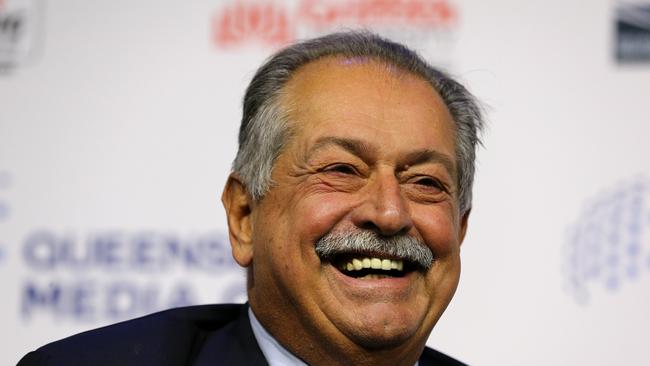Olympian task but it’s Games on, says Andrew Liveris
Brisbane Olympics president Andrew Liveris has appealed to critics of 2032 Games’ planning to be ‘urgently patient’ and stay focused on the big picture,

Brisbane Olympics president Andrew Liveris has appealed to critics of 2032 Games’ planning to be “urgently patient” and stay focused on the big picture of staging the world’s premier sporting event.
The former corporate high-flyer revealed the appointment of a chief executive of the Olympic Games organising committee was down to a handful of contenders and set to be finalised next month.
“November can’t come fast enough,” Mr Liveris told a 400-strong business lunch in Brisbane that was studded with Olympians, politicians and private sector leaders.
The absence of a CEO 14 months after the Queensland capital won the bid and reported blowouts in the cost of renovating the centrepiece Gabba stadium have raised questions about whether the Olympic preparations are on track.
But the Darwin-born former boss of US multinational Dow Chemical said the Brisbane Games, alongside those in 2028 in Los Angeles, were unique due to the unusually long lead-in time provided by the International Olympic Committee.
“Because we have been afforded this gift of 10 years, be patient with us,” Mr Liveris said. “Be urgently patient, but be patient.”
Letting the first major contract for Australia’s third Olympics, Mr Liveris said brand designers had two weeks to bid for the job of creating the Brisbane Games logo and branding.
Mr Liveris said Brisbane would use the segmented LA planning model starting with three years of engagement, education and establishment to build momentum while being “light on cost”.
This would be followed by three years of operational planning, a further three years of delivery and the final 12-month sprint to the line to ensure everything was in place when the starter’s gun fired in July 2032.
The Olympic Games could supercharge value-added manufacturing if the opportunity was seized, he said. Advanced water recycling equipment, new forms of drone technology and cutting-edge nanomaterials should be locally sourced; the free transport infrastructure could include driverless buses.
“It’s within our remit, it’s not beyond us, it’s doable,” Mr Liveris said.
He then added that the Brisbane Games would be a hybrid of the government-led business model of the 2012 London Olympics and the “entirely privately funded” Los Angeles template.
“So Brisbane 2032 in my mindset … is LA 2028 and London 2012 combined,” Mr Liveris said.
“We do have government input and oversight, which also requires … the organising committee’s finances to be cost neutral, effectively making us privately funded. That’s why we’re the hybrid.
“Does it sound complex? You bet. But I’m built for complexity,” he said.
On the possibility of infrastructure cost blowouts, Mr Liveris said: “The buck stops with me even if I’m not accountable.”
He might not be in control of venue and transport infrastructure development, but “I’m going to be engaged (and) know what’s going on.”
Citing his background as a chemical engineer, he said: “OK, if the output isn’t looking very good, we change the process … and if that means you’ve got to go to the table to work with personalities and egos, I’m used to that.”
He insisted that the “politics would keep moving” but the Games’ organisers could not “come off plan”.
“And if some of it is noisy and gets to the press and makes headlines, so be it. We will work the process to get the better output.”
On the appointment of a chief executive for BOCOG, the Brisbane Organising Committee of the Olympic Games, Mr Liveris said: “We really look forward to celebrating this appointment with you all, and other appointments in the coming months. In the meantime … I encourage everyone to please stay focused on the big picture, the global picture.”




To join the conversation, please log in. Don't have an account? Register
Join the conversation, you are commenting as Logout